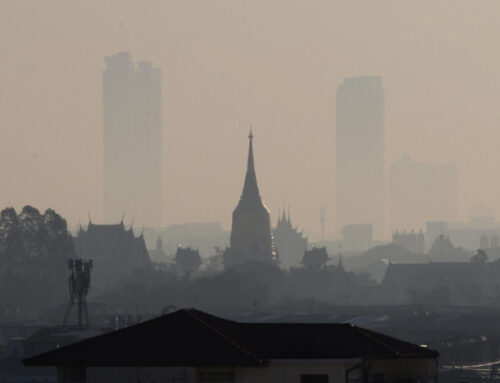Distant Dome: New Hampshire Lacks the Resources to Invest in Itself
September 27, 2025

By GARRY RAYNO, Distant Dome
A frequent refrain heard around the State House is “Government should operate more like a business.”
That is usually followed by “Just like a family, you have to tighten your belt when the money gets tight.”
Neither example comprehends how the government should operate if it is to work in the best interest of the citizens of a state.
When the government faces its biggest need is when its revenue stream is at its lowest.
If the economy is humming along like a finely tuned engine, there is less need for government services such as health care, mental health or other social services, or unemployment, or training programs.
But when a recession cripples the economy, that is when the government needs to provide the services people need to survive and come out the other side as productive citizens.
And with a recession — a state like New Hampshire which depends heavily on business taxes as the foundation of government revenue — is when the revenue stream becomes a trickle like the brooks this summer.
Business, however, faces its greatest needs when revenues are flowing in the door and it has to expand to meet the demand.
In one area, the government is much like a business.
Businesses need to invest in themselves and their employees or they will soon stagnate and competitors will grab a larger market share.
Government’s one job should be to invest in the state and its people to produce long term growth and prosperity for years to come.
But New Hampshire has been going in the opposite direction of late and now unable to invest in its people or its institutions.
For the last decade, GOP led legislatures have reduced the rate of the business taxes costing the state more than $1 billion in lost revenue.
Under the Chris Sununu administration, the state also cut the rate of the rooms and meals tax, the state’s second largest revenue producer behind business taxes and eliminated the interest and dividends tax, which in its last full fiscal year produced $186 million. It is also the only New Hampshire levy that taxes wealth.
Together is well over $1 billion that could have been invested in the state that now goes to higher corporate salaries and stockholder dividends, and investors with over $500,000 invested who paid the bulk of the interest and dividends tax, while diners saved less than a buck on their restaurant and hotel bill.
Where could that money have gone to better position the state for the future?
The best investment any state can make is in its education systems. What better way to ensure a prosperous future for its people and its businesses.
But the state has long depended on others to provide public education for its citizens, the local property taxpayers.
New Hampshire is dead last in the country for state support for kindergarten through 12th grade paying about 28.8 percent of the cost, which is misleading because about one-third of that state money is from the statewide education property tax which property owners pay just like their other property taxes.
The national average for state support for education is about 47 percent, which if the state paid in New Hampshire, would do away with most concerns about skyrocketing property taxes.
It’s not like the state hasn’t been told it needs to do more to pay for education, there is a litany of court cases over the last 30 years telling the state to institute a fairer education funding system for both students and taxpayers, but lawmakers have essentially ignored the courts.
A state’s higher education system is also another great investment in the state’s future, but New Hampshire again is 50th in the country in providing aid to the state’s university and community college systems.
New Hampshire pays an average of $4,229 per full time student in the university system when the national average is $11,683 per full time student.
And this session, the GOP legislature decided to reduce the amount of state money going to the university system, cutting state aid by 17.6 percent or $35 million putting the state more out of whack with the rest of the country and New Hampshire students more in debt, where again the state leads the country in student debt leaving college.
What New Hampshire high school graduate will want to go to the state higher education system when other institutions offer better deals with less debt. That will draw the best students away from New Hampshire, which ultimately will hurt the state’s workforce and businesses.
Instead of increasing state investments in public education, the GOP decided — as it has long dreamed — to institute universal vouchers so any parent regardless of earnings can grab about $5,000 for their child through the Education Freedom Account program which nearly doubled this school year to over 10,000 students. About 80 to 85 percent were in religious or private schools or homeschooling programs and are not leaving public schools for alternative education environments.
The vast majority of the new enrollees are students whose parents have the where-with-all to afford to send their child to private or religious schools now without the state’s help.
The additional money is like giving the family a skiing trip to the Alps on the state taxpayers’ dime.
The lack of state support for public education is going to be more telling with the cuts to federal aid to education including programs affecting about 5,500 students from low-income and first generation families, and disabled students who received academic and financial support to transition from secondary to post secondary education.
Title I funding is also at risk with the federal cuts in the “Big Beautiful Bill” that is now law.
Another investment that pays off for the state is health care for those who cannot afford it. The state took advantage of the Affordable Care Act to expand its Medicaid program to the low-income adults, which was a life saver during the pandemic and has significantly reduced the uncompensated care borne by health care providers (mainly hospitals) and that increases the premiums for private health care insurance coverage.
The federal government will likely change the expansion program reducing its 90 percent share of the cost, which would end the state’s program because it is legally dependent on the federal government for its 90 percent contribution.
The state reduced its investment in the insurance coverage under the Children’s Health Insurance Plan or CHIP, by making single parents pay part of their child’s premium and increased co-pays for others on the Medicaid program.
All of the changes in the Medicaid program are likely to mean thousands of granite staters will no longer have health insurance which will increase private insurance premiums to uncompensated care.
The federal government will also end the subsidies for health insurance plans offered on the public marketplace and stopped paying for navigators hired to walk people through their choices in the federal program.
Needless to say the state does not have the money to pick up the federal reductions to continue the programs that are an investment for the state and its citizens.
Rural hospitals will be the most burdened by the coming changes and many expect some to fail. The North Country could be the hardest hit where medical services are already difficult to access in a timely manner including child births. If you are going to have a baby in the North Country and live more than an hour from Dartmouth Hitchcock Medical Center, you better hope there is a midwife nearby.
Most people agree the arts are essential to the state’s culture and bring substantial revenues to the state.
However, led by the “Free State” mentality, almost all funding for the arts was cut in the new biennium budget leaving no money to match federal funds. Instead there is a business tax credit for a new arts fund, at a time when many other organizations such as public television and radio are seeking additional money because their federal funding has been eliminated.
The Free Staters also wanted to cut funding for the state library and its book loan program, but cooler heads prevailed.
The state’s lack of resources also affects its transportation system.
Anyone who has lived around the Concord area knows that I-93 on a Friday night is a slow ride to nowhere between the I-89, I-93 intersection to beyond the East Concord exit.
In the summertime, race weekend and about this time of year, the Friday and Sunday traffic is a very slow moving parking lot from the I-93, I-293 intersection to beyond the Lakes region.
But last week the Department of Transportation announced it was removing the planned expansion of I-93 through Concord from the state’s 10-Year Transportation Improvement Plan because its revenue stream from the state’s gas tax is not sufficient to fund the project.
That says the state is unable to sufficiently invest in its transportation infrastructure and that does not bode well for the state’s future.
Fortunately for the state, federal COVID relief and rescue, and infrastructure money has allowed the state to build buildings and facilities it otherwise would not be able to construct such as the new Secure Psychiatric Unit attached to New Hampshire Hospital, to purchase Hampstead Hospital for juvenile mental health patients, and build a new parking garage for lawmakers.
With a biennial capital budget of about $125 million, not a lot of state infrastructure is going to be built as the costs increase.
If New Hampshire wants to be more than a state to attract wealthy CEOs who do not want to pay income taxes, second-home owners, and Free Staters who want their personal freedom above all else and not pay taxes, it is going to need to do something to increase its investment in the state and its citizens.
But that is likely to mean the dreaded words tax increase.
Instead of viewing it as a political hammer, people ought to think of taxes as an investment in the state, its people and the future, just like a business’s revenue stream is what provides the resources to invest in its future.
Garry Rayno may be reached at garry.rayno@yahoo.com.
Distant Dome by veteran journalist Garry Rayno explores a broader perspective on the State House and state happenings for InDepthNH.org. Over his three-decade career, Rayno covered the NH State House for the New Hampshire Union Leader and Foster’s Daily Democrat. During his career, his coverage spanned the news spectrum, from local planning, school and select boards, to national issues such as electric industry deregulation and Presidential primaries. Rayno lives with his wife Carolyn in New London.
Search
RECENT PRESS RELEASES
Related Post


